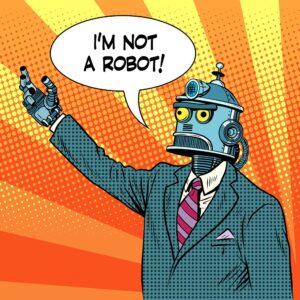An Overview of A.I. Marketing
Thanks to decades of dystopian fiction and sci-fi movies, most people have a distorted image of artificial intelligence. The fact is, AI is quickly transforming the corporate world as it uses complex algorithms and predictive analytics to convert information about consumer behavior into valuable business intelligence. Marketing with AI is yielding tremendous benefits to companies both large and small around the globe, as powerful software programs streamline marketing functions, optimize campaigns, and improve personalized customer experiences.

The use of artificial intelligence in marketing leverages technology to improve customer experiences from the first point of contact through the sale and beyond. The return on investment of marketing campaigns also benefits from AI technology as machine learning, analytics for big data, and additional processes help to optimize business strategies geared toward target consumers. Tedious, repetitive processes that once sucked up huge numbers of human capital hours are now performed by machines; generation of content, PPC ads, and web design are all possible functions of AI software.
In digital marketing, AI can optimize marketing campaigns, streamlining them in the process and taking away the risk of human error. While human ingenuity is still a requirement for the effective completion of most tasks, AI digital marketing programs can be used to generate reports strictly based on data.
To date, machines cannot copy the human attributes of empathy, compassion, or storytelling. However, AI is also not subject to the limitations of human beings. If Moore’s Law of exponential computer growth continues to hold true, AI’s future capabilities will be truly astounding.

CONTENT CURATION
In the marketing world, content creation is the act of developing topics that appeal to target consumers, creating written or visual content around those ideas, and making that information available to the audience through blogs, videos, infographics or other formats. This has become a global industry on its own; it is both extremely effective and extremely dependent on human capital. However, AI has the capability to curate and generate content. In addition, it can determine the right consumers for the content and the best channels for its delivery. While the technology is still in the early stages, AI could eventually be used to generate topics or even write first drafts based on given data or parameters.

AI-ENHANCED ADVERTISING
The digital advertising strategies of today rely on AI even at the most basic levels. Electronic billboards can be run on AI-based systems. These systems, known as “programmatic advertising,” utilize complex algorithms and big data to determine the best ads for a target market.
While ad development has historically been a creative endeavor accomplished by teams of professionals, businesses of today need to reach beyond the creative message to find the right message, timing, audience, and delivery method for the best results. Consumers have learned to blow through the overwhelming number of ads assaulting them every day with little to no attention paid to the actual messages, causing advertisers to lose money. AI allows businesses to optimize their advertising budget by placing personalized ads in front of relevant audiences. As this technology continues to evolve, it will become even more critical to business success.

AUTOMATED CUSTOMER SERVICE
The AI technology often viewed as the biggest game-changer is chatbots. Consumers are becoming more accustomed to chatbots through interactions with automated assistants such as Siri, Alexa, and Google Assistant. This technology is being utilized on numerous corporate websites to address frequently asked customer questions.
The best part of chatbot technology is the effect it can have on the consumer experience. By automating the more basic functions of customer service, chatbots provide a cost-effective means of streamlining operations and saving the human agents for more complex customer issues requiring personal attention. Some businesses don’t have the human resources to address customer questions in a timely manner; chatbots allow for customer assistance regardless of the hour of the day. AI also doesn’t have bad days; chatbots are always polite and engaging, eliminating customer complaints related to poor human interactions.
Businesses must realize that AI technology has limitations when it comes to the use of chatbots; there should always be a level of escalation that results in human interaction. However, in the future, smart chatbots may take a more active role in communication with humans using originally generated responses in real-time, useful in sales prospecting, lead generating, and customer service.

BEHAVIORAL ANALYTICS
As technology allows the collection of more complex data, companies are responding by hiring data scientists and programmers to work on their marketing campaigns. The huge number of data sets regarding consumer behavior and market trends can be overwhelming, but AI makes it accessible using machine learning and big data analysis. This technology allows for prediction of future customer behavior, which can be used to personalize advertisements, set prices, and launch campaigns based on the knowledge of what individual customers have historically done and are likely to do.
AI is not the evil force often depicted in movies. As the technology continues to evolve, businesses are finding more ways to harness its benefits to improve the effectiveness of digital marketing. For more information, contact Proecho Solutions.

6 Ways AI Is Transforming The Marketing Industry
Artificial intelligence is rapidly transforming the marketing industry. This technology can optimize a variety of marketing tasks to improve customer experiences. If you are a part of the enterprise marketing field, you probably already use some type of AI solution, but many marketing professionals still don’t have a good grasp of the benefits. Check out six advantages of using AI for digital marketing.

1. PERSONALIZATION
Today’s consumers have become used to personalized marketing messages populating their social media and electronic mailboxes, in place of the more traditional direct mail and media advertising that once dominated the field. A 2017 report by Accenture found that 43% of consumers are more likely to purchase from companies with personalized customer experiences.
AI personalizes marketing efforts as it tracks consumer behavior in areas such as browsing and purchase history, using this information to predict future brand interactions and allowing tailored recommendations about products and services to populate ads. Amazon has used an AI framework called DSSTNE to revolutionize the online consumer experience. AI technology powers algorithms that optimize advertising based on conversions and interactions, allowing effective marketing decisions to be made based on realtime information about consumer history, trends, preferences, and predicted behavior.
AI technology can also utilize natural language processing to determine mood and intention from emails and phone calls, automate real-time recommendations to improve shopping experiences, scan browsing history to present different options to consumers, and provide a retail store clerk with real-time information on a tablet or phone to help an in-store customer.

2. SEARCH ENGINES
Search algorithms are constantly improving. Integrating AI into search engine technology allows past shopping behavior to be considered in browsing, and misspellings in search terms to be identified with alternatives suggested. This software is becoming very sophisticated in determining searcher intent. AI language technology can interpret complex speech patterns and recognize spoken queries, helping voice search technology to continue to increase in both popularity and efficiency.

3. DYNAMIC PRICING
Pricing is a well-known marketing strategy, and discounts have traditionally been used to accelerate sales. However, traditional price-setting procedures cannot match the complex algorithms employed by AI to factor in demand, availability, consumer profiles, and additional factors such as season and popular trends to set prices. Dynamic pricing can be sensitive to minute-by-minute purchasing trends, with prices adjusted accordingly. Many people have experienced this technology at work when searching for a flight and finding the price has increased by hundreds of dollars in a matter of days.

4. ENHANCED USER EXPERIENCE
Online customer experiences are constantly being improved with user-friendly websites and apps. When customers have a better experience with front-facing technology, they are more likely to pursue further interaction with the brand. AI systems can adapt user experiences based on interactions in real time, creating a more user-friendly and personalized experience than traditional testing and optimization cycles could manage.
AI language-processing algorithms have become extremely advanced, allowing machines to replace humans in customer service and sales roles. This is more cost-effective and frequently more efficient. Customer service is further improved because machines are always polite and refrain from engaging in negative conversations with the consumer.

5. WHAT, WHEN, WHERE, HOW
Content marketing offers a great return on investment but requires significant human capital. The use of machine-generated content is not new, but only recently has the quality of the automatically generated articles reached a passable level. AI can be used to auto-generate blog posts and clickbait headlines based on formulas. Several global brands, including Forbes, now publish content that is partially AI-generated. AI can also use algorithms to select appropriate content for a specific audience, allowing for automation of the content curation process.
Enterprise content marketers can utilize AI to simplify the task of selecting the appropriate marketing channel from the large and still-growing list of current options. AI-powered software can target the channels with the highest chance of success for each particular marketing campaign, targeting specific leads based on brand interaction. It can also calculate the best times for launching promotions on each marketing channel.
The “how” of marketing is also being changed by automation, as AI-powered email can copy and paste content into big batches of emails, changing the name and content as needed. AI can efficiently perform repetitive tasks, freeing up marketing staff for strategic planning and other “human” tasks.

6. DATA ANALYSIS
Most businesses collect a large amount of information regarding their customers and industry but do not use the data effectively. AI can effectively process large data sets and identify trends and patterns. This allows for the creation of statistical models to predict future consumer behavior and create business intelligence models to capitalize on that information. In an increasingly competitive business environment, AI can provide critical insights for companies to constantly improve and excel.
While the technical aspects of advanced artificial intelligence may seem overwhelming, marketing software utilizing AI technology is surprisingly user-friendly. If your business has not already explored the benefits of AI-powered marketing, contact Proecho Solutions for assistance!




